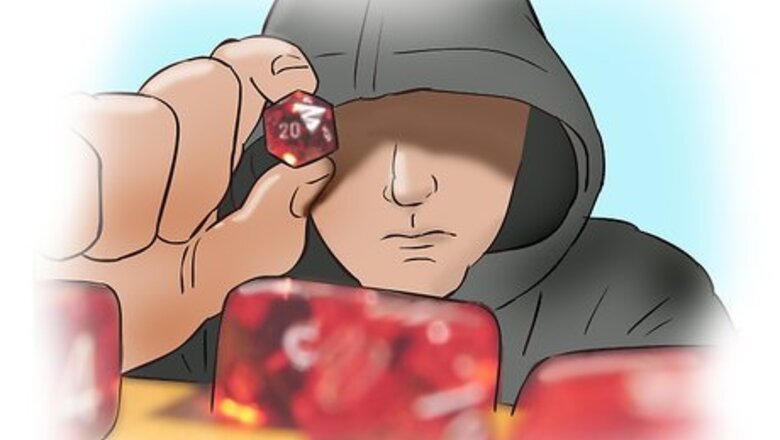
views
- Learn about the DM’s job and study the rules of the RPG you’ll be playing; make sure you have all the necessary tools like rulebooks and dice.
- Focus on entertaining players; choose between pre-written modules or creating your own adventures and take notes during each session.
- Understand that mistakes happen and adventures rarely go as planned, but it’s all part of the fun; let your players experiment and embrace your creativity.
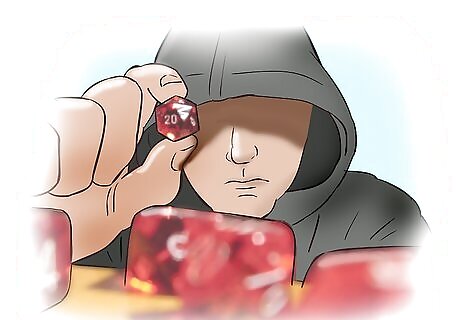
Understand what a DM does. The descriptions you may have heard of a Dungeon Master probably range from "the one who does all the work" to "You are god here". Those descriptions are usually exaggerations from people who are either ignorant of what a DM really is or the extreme interpretation of a half-truth. As a DM, you control everything and everyone that is not a Player Character (PC for short). That means everyone or anything the players may come across or interact with is controlled by you. However, the goal of any RPG should be a fun time for ‘’’everyone’’’ involved. "Everyone" cannot be stressed enough. Your responses to the players, the situations you present, the challenges you create, the stories you build together, all of it should be balanced so as to provide an enjoyable experience for you and your players. What you are not is against the PCs. If your goal is to destroy the player characters any chance you get, then you are doing it wrong. Rather, you should strive to be fair and create an enjoyable experience. This means that if the characters are having a hard time, nerf the monsters but don’t change how they would behave.
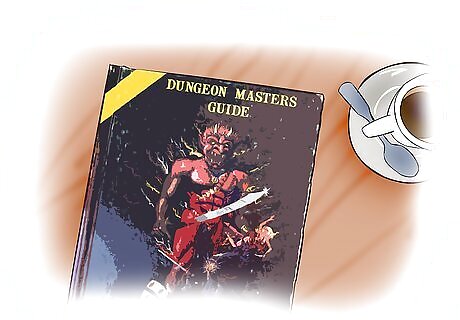
Know the rules. To be a fair DM, you are expected to have a strong grasp of the rules of the game. It may be helpful to think of yourself as an impartial judge in this respect. Just as a judge cannot do his/her job without knowing the law, a DM cannot run the game without knowing the rules of the game. To aid in this, most RPGs provide basic entry books known as "Core" rulebooks. Anything considered Core is what you need to have, at very least, a passing familiarity with. In D&D, the Core Books are the Player's Handbook, the Dungeon Master Guide and the Monster Manual. The rest should not be considered necessary for running a game. You describe the surroundings, manage the plot, and administer all of the elements of the game, including determining the outcome of battles between players and dungeon dwellers. If your players encounter a creature, choose a plan of battle, it may be up to you to roll the dice to decide the outcome, and although the rules apply specific guidelines, you may use your own judgment to work that outcome in the best way to maintain the flow and continuity of the game. It's a daunting task, but it will become easier with time, patience, and practice.
Prepare properly. For some DMs, the thrill of writing their own adventures and stories to present to their players is the reason for doing it. Others like the fact that they control everything. And then there are those who do it simply because they don’t think anyone else will do a good enough job. Regardless of why you do it, how you get ready is what breaks or makes the game. The ways you can prepare could fill its own wiki, but here are the basics for first time DMs. Remember that everyone will be comfortable with different ways and it is best to only use what works for you. Don't try to force something that doesn't feel right. Again, the end result should always be a fun game for everyone. If it feeIs like work, don't hesitate to lower your work pace.

Materials & Tools. As the Dungeon Master, you should probably have the materials required to run the game. Things like the core rulebooks of the current edition, keep those rulebooks close by and within arm's reach so that you have a quick and easy reference to the rules. Here are the tools that many experienced DMs suggest you have within arm's reach to ensure you keep the game flowing- Notebook: keeping a notebook nearby is incredibly handy because you can use it to scratch notes like if a player has a cool moment and you want to award them something special, or if something else happens that you want to jot down and keep in your memory.Be a Dungeon Master Step 3.jpg
Your job is to entertain. Maybe you rather wanted to slack off, but if the roleplay group is best suited to play on a particular day, then you should play that day. If you have no time in between games, consider running modules. They will be presented for characters between a certain levels, with challenges scaled to fit. This is the easiest and fastest way to run a game, as most of everything is done for you. The only thing you have to do is read the adventure. It is suggested that you re-read a few pages ahead of where you stopped at every session right before the next session, to refresh your memory for the game at hand. If you have a few hours to devote between games, running modules is still a strong option. However, you may want to re-write parts of the module to fit the game or particular story line(s) you're running with the PCs. Changing descriptions of locations or replacing treasure found in the module with items better suited for your players are good and easy places to start. As you progress in skill, you may start lifting whole encounters from one module and writing it into another. Not only does this allow you to essentially pick out the best parts of an otherwise so-so module, but players who may have read or run through the module before will be in for a surprise! Writing your own adventures is a possibility, though for new DMs it is still recommended that you run a module first, so you're only focusing on one concept at a time (learning the rules). In time you will be more inclined to change things and write new scenarios yourself. Pulling encounters from published works and tying them together would be a good start. They can then slowly be replaced with your own works. What you ultimately want to achieve is that your campaign is like a movie you would be interested in watching which invokes a sense of mystery. Many dungeon masters spend a long time reading the rulebooks over and over again. This is actually a form of procrastination. If you don't have anyone to play with – don't spend time planning scenarios. Keep your ideas in the back of your mind and instead learn to generally become a good storyteller. The only way to become a valuable game master is to gain practical experience and learn from each mistake as it brings you closer to perfection.

Take notes. During and immediately after the game session, be sure to jot down a few notes about what the players did, what your NPCs did, how your other NPCs and bad guys will respond to new events, the names of NPCs you may have made up on the fly, and any other details you may find important.

Be willing to make mistakes. Sometimes things will not go as you plan. Whether it is a mistake on how a rule works, or confusion of how a spell would affect an NPC, or your carefully written adventure is thrown aside by players that think a random NPC you had nothing written for is FAR more interesting than your save-the-maiden quest, problems will occur. Frequently. The best tool any DM has in their toolkit is the ability AND willingness to adjust to the circumstances. If the problem is a rule disagreement, don't let that derail your game. Spend no more than two minutes looking up anything, unless the character in question may die from the result. Calmly explain your ruling on how it will work, resolve to look it up after the game or between sessions and move on. Nothing kills a game faster than bickering for 15 minutes between two people while the rest of the group is bored. Keeping the game going is better than killing the game while trying to get every detail right every time. If the problem is that the players did something that you didn't plan for, anticipate, or want them to do... be willing to say "Yes"... or at the very least don't say "No". Some DMs can make things up on the fly - do so if you can. If you're not comfortable with that, ask for a short break (people can go to the bathroom, eat, whatever) while you write up some ideas and make a short outline plan for this new and exciting direction they are going. Don't excuse yourself if the players catch you with having broken Dungeons & Dragons-rules. If they point out that your wizard wears chain mail, agree, be mysterious about it. There is no tragedy in retconning if you forgot an important aspect.
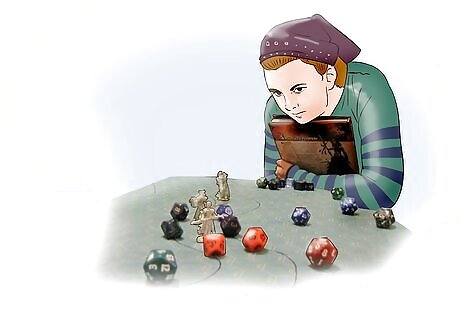
Follow the Golden Rule of DMing: The players will always do something you never thought of and could never have anticipated in a million years. No matter how many solutions or tangents you plan for, it is likely they will go in the one you did not. It is best that you accept this reality now, otherwise you're setting yourself up for pretty frequent frustration when it happens... over, and over, and over... Don't be discouraged by this though! This detail keeps the game exciting and surprising for you, which can be very enjoyable. The players can be their own worst enemies. Their dreadful imagination can give you inspiration about your scenario and how it unfolds. If the players roll a lucky dice and kill off what you intended to be the main villain, let him go. Being fair also means denying yourself. If you really don’t want the players to go in a certain direction there are ways of changing it. You can make certain areas contagious which also yields an opportunity for roleplaying. A realm can be controlled by a dark lord. Or areas you don't want them to visit can be excluded from the maps you create. You can also have some of the players' gear stolen. This will very likely make them follow where you want them to go.
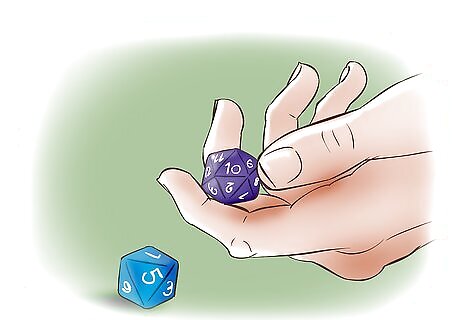
Be involved, creative and reasonably realistic. Not only will this make the game more decisive, it will make it more fun. No one wants to be playing when the dungeon master is saying "ummm...well...you know… you just...found a cave, yeah. And in the cave...is...ummm...an imp. Ummm...what do you do?" Instead, say "You enter the cave and its dampness overcomes your senses.” You hear a *Imitate the sound of how you imagine an imp in the distance would sound like*. If the player hesitates make the imp attack. If the cave is empty, don’t outright state it. Instead say “You see nothing.” You will want to become such a good game master that the players are not munchkins but actually want to roleplay. The more you prepare, the easier it will be to give the players this confidence. Remember that until you say it exists, no one knows what is on that piece of paper behind your screen. Whether you read it directly or change details as you go along, unless you tell the players that they will think it was meant to be that way all along. Use this to your advantage. Consider who you are playing with. If you are given the opportunity to play with others you should seize it. Also, despite your most careful preparations things will rarely go as planned. Since you are dealing with people, expect there to be conversation outside of the Role-Playing world, and accommodate accordingly. If the game is not going to the preconceived plan you have created, try to incorporate your original ideas in new ways to the current player predicament. Proper|y involve the players. Never fulfill their wishes directly. Their characters should be designed according to the rule book. They should be given goals which you can intertwine with the story you designed. Keep in mind who the player characters are. For examples, have your non-friendly NPCs address the player with the highest charisma. The point of going on an adventure is to see and experience new things. Be creative with your descriptions and scenarios to give every location and interaction its own flavor. Don't just drone on about the surroundings; change your voice to show you actually care. Taking on accents of various NPCs also adds a bit of flavor to your dungeon. Include a world map. You may want to have figures and grid maps to make the combat easy to follow. You may even have pre-designed dungeon halls. If you are terrible at drawing there are ways to improve your fine motor skills. Don't let your creativity run amok, however. You would like to create a consistency within your game world. While you may be pretending to be in a fantasy world where magic is common, its pervasiveness should be consistent. Keeping your work within this guideline can mean the difference between an engaging fantasy story and a parody where everything seems hokey and dumb. There are expansion books designed for creating scenarios taking place in another franchise such as The Lord of The Rings. If your scenario takes place in such a well-known franchise, don’t include the main characters from there. Instead make up your own. If someone lectures you about the universe, point out that it's your interpretation of it that matters.




















Comments
0 comment